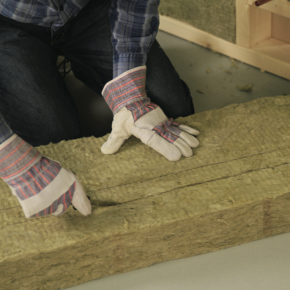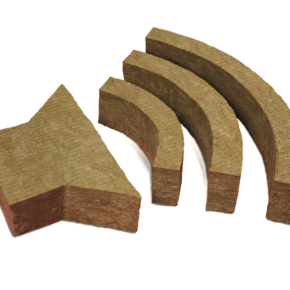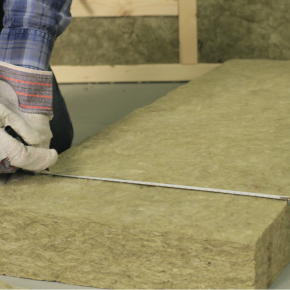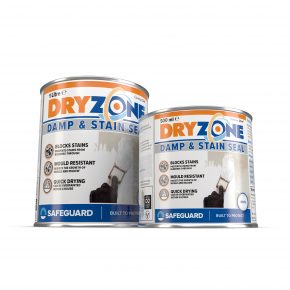
Noise pollution: quiet in the house
Noise pollution is a growing issue. Will Wigfield, senior technical consultant at ROCKWOOL looks at the problem and explains, in the latest issue of ABC+D magazine, how stone wool insulation can help reduce issues in new build and retrofit residential projects.
We’re becoming more sensitive about the intrusion of noise in our everyday lives, especially at home. In fact, noise has been proven to have a negative impact on over three quarters of the UK population at home.
Recent research carried out by DEFRA and Quiet Mark – the organisation behind the distinctive purple mark of approval which is awarded by the UK’s Noise Abatement Society to the quietest products and appliances on the market – provides great insight into the problem.

“Noise has been proven to have a negative impact on over three quarters of the UK population at home” Will Wigfield, ROCKWOOL
It showed that 62% of respondents felt that noise from their own household appliances adversely affected the enjoyment of home life to some extent while 53% confirmed that outside noise affected the extent to which they opened their doors and windows. Overall, 76% felt that the quality of their home life is affected by noise.
Noise from outside the home also impacts; spending time in the garden, balcony or similar (46%), sleeping (46%), concentrating (45%), reading and writing (43%), resting (41%) and entertaining guests (27%).
The daily cacophony of noise that surrounds us is also changing our sleep patterns as respondents confirmed they had been woken up, kept awake, or changed the time they went to bed or got up because of; noise from within the home (41%), noise from neighbours inside their homes, (through the wall, ceiling or floor) (33%), noise from neighbours coming through windows (28%) and being woken by other household members (37%).
According to ICM research, conducted in 2012, more than one in ten (11%) of Britons who have been disturbed by noise in the past 12 months complained about the din from neighbours walking on wooden floors, rising to one in four (25%) of those living in flats yet, the same research showed that 2.9 million British householders had removed carpet and installed wooden floors in the past three years.
Take into account the fact that we have an ageing housing stock, greater urbanisation, increasing road, rail and air traffic, not to mention the wider adoption of domestic electronics, TV and surround sound systems in the home and it’s clear that the problem of unwanted noise pollution is on the increase.
Effective sound insulation can make a significant impact in reducing noise in homes and apartments. It can be applied to dampen sound reverberation; prevent noise affecting other rooms or buildings; reduce the noise from outside, including wind, rain, hail, traffic, etc and minimise noise pollution from heating, ventilation and air-conditioning and other equipment within the space.
In 2003, the UK Government enforced the new Approved Document E of the Building Regulations. This legislation was used to outline the issue of unwanted noise transmission within residential dwellings in an attempt to improve modern living standards.
As well as listing new performance requirements, Part E established Pre-Completion Testing to help enforce these standards. Under these regulations, new buildings are required to have a minimum airborne sound insulation performance of 45 DnT,w + Ctr dB for separating walls, floors and stairs, and a maximum impact sound insulation of 62 L’nT,w dB. Refurbishment projects, or dwellings formed by material change of use, need to meet slightly less strident standards of 43dB and 64dB respectively.
In meeting these acoustic requirements, the choice of insulation material will have a major impact. Stone wool insulation is renowned for its excellent acoustic properties. The insulation’s open, fibrous structure makes it suitable for absorbing and regulating noise in residential dwellings for the lifetime of the building.
Stone wool is also incredibly versatile, with products and systems available to suit a variety of typical building applications. These include metal and standing seam, flat, green and pitched roofs; ground, exposed and separating floors; internal partitions and separating walls; fire protection and fire stopping; HVAC and masonry cavity walls.
Contact:
ROCKWOOL,
Pencoed,
Bridgend,
United Kingdom,
CF35 6NY
Phone: 01635 862621
Fax: 01656 862302
Visit Supplier's page
Latest news

24th February 2025
Safeguard: Redecorate after disaster with Dryzone Damp & Stain Seal
Make your living space feel like home again with Safeguard Europe’s Dryzone Damp & Stain Seal – a high-performance stain blocking paint for interiors.
Posted in Articles, Building Industry News, Building Products & Structures, Building Services, Ceilings, Damp & Waterproofing, Facility Management & Building Services, Interior Design & Construction, Interiors, Paints, Paints, Coatings & Finishes, Restoration & Refurbishment, Retrofit & Renovation, Walls
24th February 2025
Vent-Axia Launches Smart High-Speed Hand Dryer
Vent-Axia has launched the next generation of hand dryer with its Tempest SmartDry high-speed hand dryer. Ticking all the right boxes for a premium hand dryer, the Tempest SmartDry is designed with a built-in HEPA filter, antimicrobial cover, and patented noise-cancelling technology.
Posted in Air Conditioning, Articles, Building Industry News, Building Products & Structures, Building Services, Facility Management & Building Services, Heating, Ventilation and Air Conditioning - HVAC, Innovations & New Products, Restoration & Refurbishment, Retrofit & Renovation
24th February 2025
Hush: Maximising acoustic insulation in floating floors
Hush Acoustics offers acoustic insulation solutions for all types of floating floors to help create quieter, more comfortable homes and acoustically superior non-domestic buildings.
Posted in Acoustics, Noise & Vibration Control, Articles, Building Industry News, Building Products & Structures, Building Services, Facility Management & Building Services, Floors, Insulation, Restoration & Refurbishment, Retrofit & Renovation
24th February 2025
Teledyne FLIR: Thermal imaging for data centres
Data centre maintenance teams have a big share in safeguarding the critical resource that customers and businesses depend upon. Fortunately, they have one secret weapon that enables them to spot issues in an early stage before they turn into big problems – FLIR thermal imaging.
Posted in Articles, Building Industry News, Building Products & Structures, Building Services, Facility Management & Building Services, Information Technology, Innovations & New Products, Posts, Research & Materials Testing, Retrofit & Renovation, Sustainability & Energy Efficiency, Thermal Imaging and Monitors
 Sign up:
Sign up: